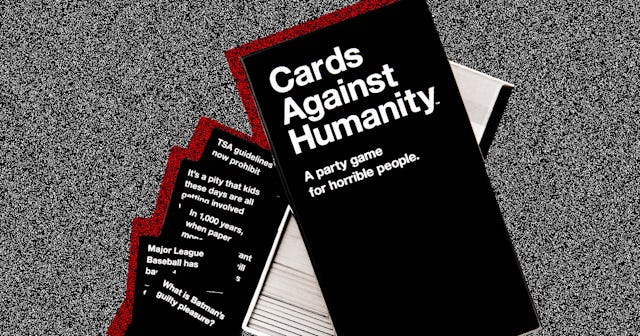Black 'Cards Against Humanity Writer' Claims He Was Fired After Speaking Up About Racism

Cards Against Humanity might not have been quite so tongue-in-cheek with its racism and sexism
A pretty damning Polygon article details the allegations employees have been making about a racist, sexist, oppressive office culture at the Cards Against Humanity headquarters in Chicago, and as a result, one of the game’s eight co-founders, Max Temkin, has stepped down from his role. And since that article published, a former Black employee has stepped forward and written his own account of what he went through working for the company.
Polygon says it spoke with 21 current and former employees and contractors of Cards Against Humanity, plus eight other colleagues who knew about the culture there – most of them anonymous because they feared retaliation from their bosses. They pointed to Temkin as a leader of a culture that scared and silenced vulnerable writers: People of color, queer people, and women, but especially Black women and non-binary people. They described how the company’s lack of an HR department was a running joke among the higher ups.
In one of the most horrifying accounts, a Black former writer describes how another writer contacted his family which resulted in him being forcefully admitted to a mental institution after he began raising questions about racism at Cards Against Humanity — specifically, the white co-founders’ decision to allow a card that said “the n-word” in the game. Nicolas Carter wrote on Medium about how company leadership dismissed accusations of racial bias by pointing to 14 total “black cards,” which he hadn’t written. A spokesperson from CAH claimed, “No Cards Against Humanity employee participated in such a process. Neither of our head writers contacted this person’s parents, but we understand that one of our contract writers (then a former part-time writer and a personal friend of Nico’s acting completely independently of the company) contacted his family to express concerns about his mental health.”
“When I heard that the majority of the owner-writers wanted to put the n-word into the game, I felt like my presence might have always been a simple permission structure for them,” Carter wrote. “By occupying that space, I was implicitly endorsing them and allowing them to do what they wanted while pointing to me and saying, ‘but, look, we have a black guy.'”
A representative from CAH said this about the card in question: “The card under consideration, ‘Saying the N-word,’ was submitted by a contributing writer, considered by the founders, and rejected on August 4, 2018. This quote also implies that the card contained the N-word written out, as opposed to the phrase ‘the N-word.’ This is deeply misleading. Cards Against Humanity has never printed and would never print the N-word written out.”
Hindsight is 20-20, but fans of the game really don’t need to look far to see evidence of the kind of racist environment Carter and other Black employees complained about. As Polygon points out, it’s all in plain sight, like in how Cards Against Humanity sells and markets products like the “Bigger, Blacker Box,” a storage container for cards that alludes to its racially and sexually charged humor. It’s a little less tongue-in-cheek once you find the hidden card inside the storage box: “The biggest, blackest dick.” When an even bigger storage box was released, its secret card read, “A dick so big and so black that it is a problematic stereotype.”
You know what you’re getting when someone busts out Cards Against Humanity at a party. It’s the “game for horrible people.” That’s what it says right there on the box. During the game, players can use cards that make light of some of the heaviest, least-PC topics out there — racism, sexism, violence, child abuse. It’s all supposed to be tongue-in-cheek. You can play the cards during the game because you’d never say those sorts of things for real. It’s a type of satire. Or is it?
Cards Against Humanity was co-founded by Temkin, Josh Dillon, Daniel Dranove, Eli Halpern, Ben Hantoot, David Pinsof, David Munk, and Eli Weinstein, a group of eight childhood friends, all white, who grew up together in the Chicago suburbs. They launched the game as a free download online, before eventually running an extremely successful Kickstarter campaign to have it printed. It’s now the bestselling card game on Amazon, and the company releases semi-frequent expansion packs filled with new jokes for people to use while they play. While the original jokes were all written by the eight co-founders, they’ve since employed a writers’ room filled with staff writers and freelancers who help submit ideas for new cards.
Occasionally, the company has pulled cards that are found to be too problematic, like one from the original set that read, “Passable transvestites.” But cards being pulled only means they aren’t printed for new sets that are sold. They’re still circulating in sets that were already purchased.
In a statement, Cards Against Humanity leadership said Temkin has “stepped down from the company and will no longer interact with staff” as of June 9.
“I wonder what would happen if the funniest, most persuasive people in the country stopped acting like it doesn’t matter who we work for or what we say,” Carter wrote, about his experience working with the company. “Maybe not as many people would die, maybe some of the kids wouldn’t suffer as much, and maybe some truly important ideas would be argued for convincingly.
“My point is we shouldn’t have to play along, I was mad, still am, and you should be too.”
Update: an earlier version of the article stated Carter was the only Black writer for the company, but the company claims “At the time Nico left, there was one other Black writer in the writers room, and there was at least one other Black remote contributor.”
The CAH statements were also added.
This article was originally published on